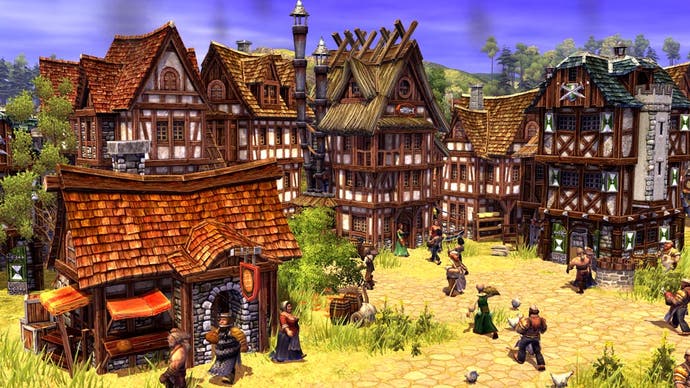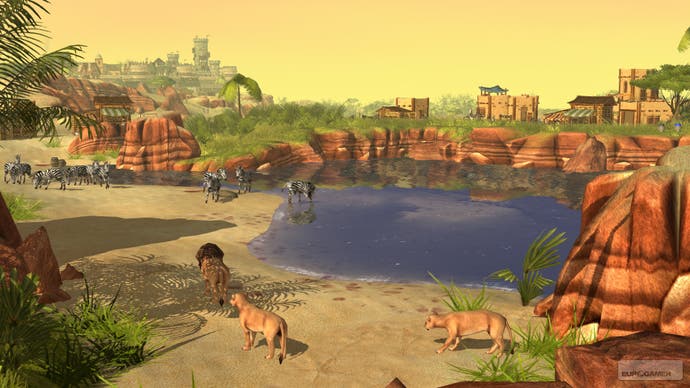The Settlers: Rise of an Empire
Fall of a franchise.
Indeed, the importance of trade routes has all but vanished, since Settlers will find their way around the map with uncanny accuracy. While you can build paths and roads to link your sprawling domain, they're simply a way to speed up Settlers movement rather than to guide them to the things they need. What at first seems like a pleasant change from the usual tedious micro-management soon leaves you feeling rather redundant. For anyone with even a sliver of experience with this sort of game, you'll be able to upgrade your town, promote your knight and fill your storehouse within an hour or so. This is just as well, since the game annoyingly wipes the slate clean and starts you from scratch at the start of each mission, regardless of how well you did previously. Even though the campaigns are all linked, and you're clearly playing the same ruler across all of them, all promotions and cash reserves are rewound each time. You can't even place additional storehouses, forcing you to ferry goods all the way across the map even when your coffers are groaning with cash, wood and stone. Forcing you to repeat the same basic settlement building steps over and over may pad out the gameplay, but it soon becomes a patronising chore.
So rather than the challenge coming from your ability to design and maintain an evolving settlement, the actual city-building aspect soon takes care of itself leaving you to tackle the flimsy mission objectives with the knight. These range from basic exploration - make contact with the village to the north - to more complex military goals - like sneaking a thief into a fortified town, an arcade-style task which proves horribly problematic for a strategy game engine. None of them are particularly engaging, while many - such as the besieged monastery that begs for your help in the crucial task of delivering nine brooms - are almost hilarious in their pointlessness.

As the missions tick by, the importance of military muscle increases exponentially until the game has slyly become the sort of half-arsed medieval RTS you've been hoping it would avoid. The fact that The Settlers has always been a bit rubbish when it comes to warfare hasn't deterred Blue Byte from once again trying to force their square peg into a round hole. Rather than seizing on what has always made The Settlers different - the pastoral mood, the obsession with the minutia of rural production - they've tried to be both languid construction game and fast-paced click-drag wargame, and the result lands between the two stools with an ugly splat.
Strategy is generally unimportant in the military confrontations, since it's often just a question of who has the biggest army, rather than who has used the terrain to their advantage or amassed a balanced fighting force. A shitload of soldiers is enough to deal with most situations. Given that it's so easy to stockpile gold and resources, you'd have to be playing horribly to not be able to immediately summon up sixty or more swordsmen and archers when trouble comes a-calling. Capturing an enemy outpost automatically destroys every building and road in the territory anyway, so there's no tactical advantage to be gained - just more land to fill up with woodcutters and pathways.
Also, it's worth mentioning that your knight proves laughably inept at actually, you know, being a knight. Even the midst of another easy victory, their health plummets like the chart placing of a novelty single after Christmas. They can't die - they just teleport back to the castle to recuperate - but having a crucial horse-mounted avatar that can be defeated by a couple of wolves is typical of the game's crudely balanced design.

The game tries to stretch its lifespan with a custom game mode - which features sixteen maps some of which are open-ended, while others are objective led - and support for both online multiplayer and LAN matches. Predictably, these are even more heavily skewed towards conquest and military might. It's enough to offer basic multiplayer amusement but, when you consider what the current crop of RTS games are doing online, this rather rudimentary and glitchy effort feels included because they thought people would expect it, not because there was a pressing need for it. And I haven't even started on the rather clunky technical aspects of the game, like the way it chugs while rendering a basic snowfall effect, or how scrolling across the map or rotating the view results in juddering lurching leaps. When I think of the sights that World in Conflict was able to confidently toss at my monitor, it's actually rather embarrassing that this underachiever can't even deliver a smooth experience for a game considerably less complex.
It's a small improvement over the last Settlers, and therefore a game that many devotees will be rooting for, but there's no getting away from the fact that judged against its peers, or even its own ancestors, this is an average offering in terms of depth, challenge and longevity, and blighted by fussy technical snags to boot. There's just enough of the original charm left in its DNA to make Rise of an Empire worth a look for the truly dedicated fan, and I suppose it makes for a fairly accessible introduction to this Olde Worlde RTS sub-genre for cautious newcomers, even though you should really just take the plunge and pick up Anno 1701 instead. It depresses me to type this, but maybe The Settlers' time has passed. As long as it tries to be all things to all people, instead of playing to its unique strengths, another entry can only send it deeper into the realms of mediocrity. And this series deserves better.
